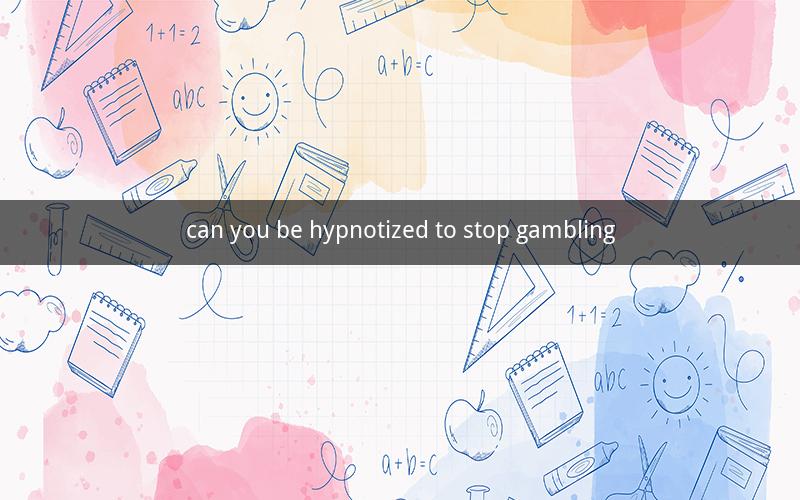
Can You Be Hypnotized to Stop Gambling?
Table of Contents
1. Understanding Hypnosis
2. The Science Behind Hypnosis for Gambling Addiction
3. Hypnotherapy as a Treatment for Gambling Addiction
4. The Hypnotherapy Process
5. Potential Benefits of Hypnosis for Gambling Addiction
6. Risks and Limitations
7. Success Stories
8. The Role of a Hypnotherapist
9. Combining Hypnosis with Other Treatments
10. Conclusion
1. Understanding Hypnosis
Hypnosis, also known as hypnotherapy or hypnotic suggestion, is a state of focused attention and heightened suggestibility. It is often associated with the image of a hypnotist dangling a watch in front of someone's eyes, but in reality, hypnosis can occur naturally during various activities, such as daydreaming or losing track of time while reading.
2. The Science Behind Hypnosis for Gambling Addiction
The idea of using hypnosis to stop gambling addiction is rooted in the belief that it can help individuals gain self-control and alter their behaviors. Hypnosis works by bypassing the conscious mind and accessing the subconscious, where ingrained patterns and desires may be more susceptible to change.
3. Hypnotherapy as a Treatment for Gambling Addiction
Hypnotherapy is a form of therapy that uses hypnosis to treat various conditions, including gambling addiction. It aims to reframe negative thought patterns and associations with gambling, helping individuals to develop healthier coping mechanisms.
4. The Hypnotherapy Process
The process of hypnotherapy for gambling addiction typically involves several sessions with a qualified hypnotherapist. During these sessions, the hypnotherapist may use guided imagery, positive affirmations, and other techniques to help the individual explore the roots of their addiction and develop strategies for overcoming it.
5. Potential Benefits of Hypnosis for Gambling Addiction
There are several potential benefits to using hypnosis for gambling addiction, including:
- Increased self-awareness: Understanding the underlying causes of gambling addiction can lead to better self-management.
- Enhanced willpower: Hypnosis may help individuals build stronger resolve and control over their addictive behaviors.
- Stress reduction: Hypnosis can help alleviate stress, which is often a trigger for gambling.
- Emotional regulation: By addressing underlying emotional issues, hypnosis can help individuals manage their emotions more effectively.
6. Risks and Limitations
While hypnosis can be a helpful tool for some individuals, it is not a guaranteed solution for gambling addiction. Some potential risks and limitations include:
- Not everyone is susceptible to hypnosis: The effectiveness of hypnotherapy can vary greatly from person to person.
- Temporary relief: Hypnosis may provide short-term relief, but ongoing support is often needed to maintain changes.
- Relapse: Individuals who have been hypnotized to stop gambling may still be at risk of relapse if they do not engage in other forms of treatment or support.
7. Success Stories
Many individuals have reported positive outcomes from hypnotherapy for gambling addiction. These success stories often involve individuals who have been able to overcome their addiction and lead healthier, more fulfilling lives.
8. The Role of a Hypnotherapist
A qualified hypnotherapist plays a crucial role in the success of hypnotherapy for gambling addiction. They must be trained in both hypnotherapy techniques and addiction counseling to provide the best possible care.
9. Combining Hypnosis with Other Treatments
Hypnosis can be an effective component of a comprehensive treatment plan for gambling addiction. This plan may also include cognitive-behavioral therapy (CBT), support groups, and other evidence-based treatments.
10. Conclusion
While hypnosis is not a one-size-fits-all solution, it can be a valuable tool for individuals struggling with gambling addiction. By working with a qualified hypnotherapist and incorporating other treatment methods, individuals can increase their chances of overcoming their addiction and reclaiming their lives.
---
Questions and Answers
1. Q: What is the main purpose of hypnosis in treating gambling addiction?
A: The main purpose is to help individuals gain self-control, reframe negative thought patterns, and develop healthier coping mechanisms.
2. Q: Can anyone be hypnotized?
A: While most people can be hypnotized to some degree, the effectiveness can vary depending on individual susceptibility.
3. Q: How many sessions of hypnotherapy are typically needed for gambling addiction?
A: The number of sessions can vary, but it often takes several sessions to achieve significant results.
4. Q: Is hypnosis a safe treatment for gambling addiction?
A: When performed by a qualified professional, hypnosis is generally safe. However, as with any treatment, there are potential risks and limitations to consider.
5. Q: Can hypnosis help with the financial consequences of gambling addiction?
A: Hypnosis can help individuals develop better financial management skills, but it may not directly address the financial consequences of gambling.
6. Q: What should I look for in a hypnotherapist for gambling addiction?
A: A qualified hypnotherapist should have experience with addiction counseling, be licensed or certified, and have positive reviews from previous clients.
7. Q: Can hypnosis help with other addictions, in addition to gambling?
A: Yes, hypnosis can be used to treat various addictions, including alcohol, drug, and food addictions.
8. Q: Is it normal to experience resistance during hypnotherapy?
A: Yes, it is common to experience resistance, but with patience and support, individuals can often overcome it.
9. Q: Can hypnosis help with the psychological symptoms of gambling addiction?
A: Hypnosis can help with psychological symptoms by addressing underlying emotional issues and promoting stress reduction.
10. Q: How can I find a hypnotherapist for gambling addiction near me?
A: You can search online directories, ask for referrals from addiction counselors, or contact local hypnotherapy associations.